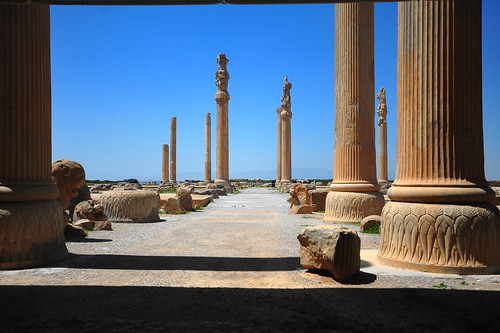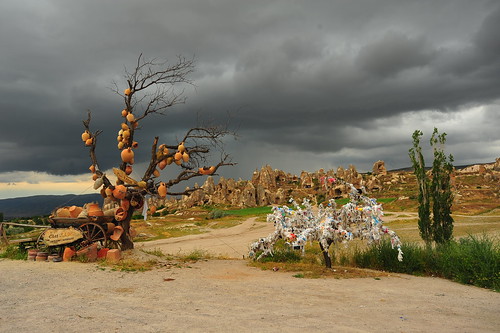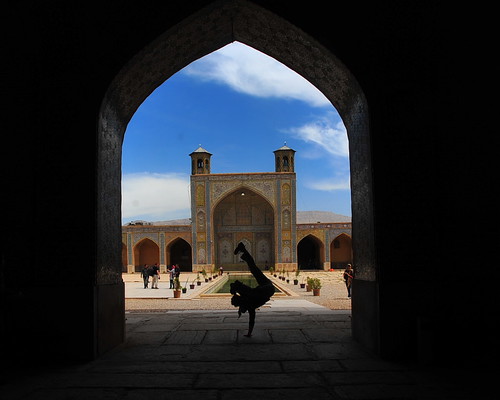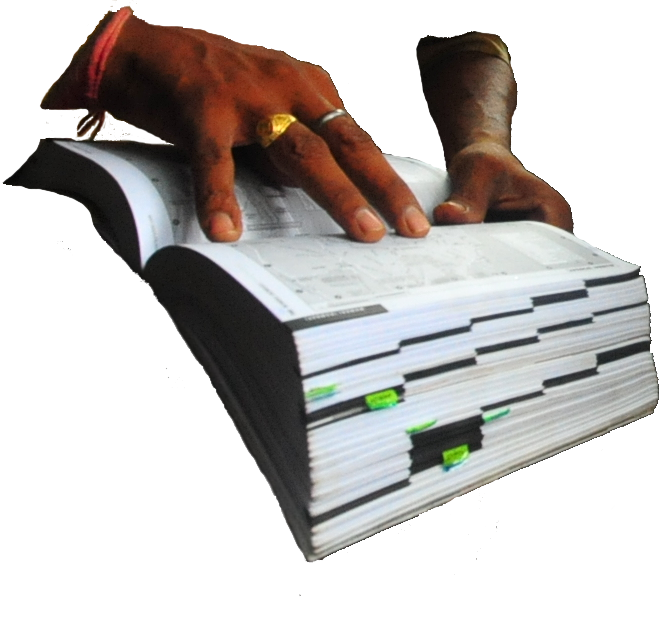 Plan ahead, loosely – *If* you have a limited amount of time to travel, get out a GoogleDoc or an Excel spreadsheet and plan out specific dates of where you want to be, where you’re planning to stay, and how you’re going to travel from city to city. Having some kind of plan can save you a lot of time waffling about in a foreign country if/when you get completely lost. You can get quick overviews of a destination from a Lonely Planet or on Wikitravel. Plan ahead, loosely – *If* you have a limited amount of time to travel, get out a GoogleDoc or an Excel spreadsheet and plan out specific dates of where you want to be, where you’re planning to stay, and how you’re going to travel from city to city. Having some kind of plan can save you a lot of time waffling about in a foreign country if/when you get completely lost. You can get quick overviews of a destination from a Lonely Planet or on Wikitravel.
“Those guidebooks are super useful and they get you excited about the trip. plus they have TONS of useful information.” – Stephanie Quan.
“Most travel guides – or rather, really just Lonely Planet and Rough Guides, will have what the best price would/should be for a savvy tourist. Be sure to consult them ahead of time to make sure you’re not making an ass out of yourself and travel companions.” – Annah Kim
- Keep an open mind – That said, keep your mind open to change when you’re traveling; my best travel experiences have been the spontaneous ones. If you set anything (too much) in stone, you’ll just be limiting your experiences.
- Use this blog – “Make sure to ask Calvin for his itinerary through the part of the world you want to visit, because he probably already has a very good one you can just take and modify.” – Cynthia Koo of cynthiakoo.com
- Avoid tour groups - Unless the country is North Korea or Iran — which REQUIRES some foreigners to be apart of approved tour companies in order to enter their borders — always travel independently. You’re young, you need the freedom, and you’ll meet so many more people DIY. Part of the experience is to get lost and find yourself, not pay money to be led around like cattle. You’ll also save more money this way.
- Realize that the world is changing - Western Europe, USA, Australia — they’re all stable first world regions that will change very little in the next 50 years. So whether you see these places now or later, it won’t make a difference; save the first world vistas when you have a better paying job or when you have a family (although there’s nothing wrong with visiting them if you’re passing through or have to go for a wedding or something).
The reason we tend to favor traveling to regions like the Middle East, South Asia, South America or Southeast Asia is because while they are tougher to travel through, there will be no other time in our life where we will be as young or healthy to handle it. Furthermore, they’re all places that are changing and will continue to change dramatically within our generation so you might as well see those places now and say that you were there “before the revolution” or “during the _____ crisis.” Being in a place that is so relevant to current events significantly adds to the experience and you really do feel like you become apart of history. As I tell everyone about my trip in North Korea: Until we have the means to build a time machine, North Korea is the closest you’re going to get!
Finally, the bottom line is that these places are CHEAP: my summer in South Asia and Southeast Asia allowed me to actually increase funds in my savings account because I wasn’t spending those 3 months in expensive Western Europe or USA.
- Pick the right seasons – Save money by traveling to a country during its low season. You have to do research on the specific country ahead of time to see when that is, but it’s usually when the weather is the worst. Examples include most of India during the monsoon or the Middle East during the summer.
But why go when the weather is bad? The reason is because you’re young; most of you can better handle a spot of worsening weather instead of a 500% increase in prices when the seasonal weather is good. Think about how much money you can save while seeing 5x as much.
- Ditch the excuses and travel the world in a “New York minute” (This style isn’t for everyone) – I credit this to having grown up in New York City: it is possible to see *a lot* in a single day. So if you want to see something like 12 cities, 4 countries, and 3 continents in only 11 days perhaps take a leap of faith and spend about of 1-2 days per destination. You may not be always successful and it might be too crazy of a pace, but the time crunch will generate that adrenaline rush so you can be more efficient with your time, see more than you ever think you would, and make you feel like you really did have an adventure when it’s all over.
- Learn how to Monsoon – The essence of “monsooning” is to treat travel like a buffet: take advantage of your youth and use that energy to sample as much as possible in a short amount of time. That way you get a better idea of where to come back to when you’re older. This attitude pushed me to see 35 countries while never missing a class during my first 2 years of medical school and even return to places like India and China in the meantime. And to this day I don’t regret “missing out” on anything.
- Don’t let others influence your trip too much – “Traveling is one of, if not the best, root cause of personal growth. That being said, make the most of it and don’t let other people’s opinions taint your experience. This includes things like persuading you to be more risk-averse, telling you what you should do when & where (because they always wanted to do it and thus need to live vicariously through you), and letting people keep you from having the mind-blowing, taste-bud exhilarating, eye-opening experiences that you are meant to have while on your trip.” – Annah Kim
- Choose good banks & credit cards - Some credit, debit or ATM cards will charge insane fees if you use them overseas. Others will instead reward you with points if they’re used for travel. So research ahead on your bank’s travel fees. If you’re an American Express cardholder (American Express cards are generally known for being good for traveling), make sure you also have a travel-friendly Visa or a Mastercard as backup as not everywhere can accept an AMEX. I personally recommend a combination of an American Express card and a JP Morgan/Chase Sapphire Preferred card as excellent all-around travel cards.
Credit and debit cards are also great ways to prevent from being scammed.
And “if you don’t meet the requirements for some of the credit cards with the no-exchange-rate travel perks- check out some of the account options with banks such as HSBC. I lived in Malaysia and went to India, Hong Kong, and other places without a SINGLE exchange fee. All on the lowest-ranked checking account at HSBC.” – Annah Kim
- Call your banks and phone companies ahead - Call your banks ahead regarding your trip so they don’t lock out your cards when they suddenly see international charges posted to your account. Being locked out means having to call your banks from overseas = time & money wasted.
And don’t forget to also “call your phone company if you plan on using your phone.” – Stephanie Quan
- Make lists – “Make lists if you start getting nervous. Even if its a month ahead. You might forget something later, so just keep a running list of what to bring. It’ll ease the jitters.” – Stephanie Quan
- Depending on where you’re going buy your flight tickets at a set time before departure - Time Magazine and ABC News have written articles about how flights are cheapest around 100 days before departure. Huffington Post says 54 days exactly for domestic flights. Quartz released a fascinating article how flying to certain regions of the world consistently becomes the cheapest at certain periods before departure. It doesn’t hurt to buy early.
- Buy your flight tickets on Tuesday or Saturday nights - I’ve heard that’s when most airlines reset their prices. This isn’t an exact science, but I’ve noticed these trends that have been good to my budgets in the past few years.
- Find your “gateway cities” - Want to fly into Phnom Penh but the direct flight there is too expensive? Then fly into nearby Saigon for $400 USD cheaper and take a $10 bus across the border into Cambodia. Same goes for flying into Montevideo, Uruguay and taking the 2 hour, $15 ferry into Buenos Aires, Argentina for $700 cheaper than flying direct to Buenos Aires. That way you’ll get to see more, still arrive at your intended destination, and save hundreds of dollars in the process. A good website to find these kind of what I call “gateway cities” is Kayak.
- Use more than one website to find cheap flight tickets – My favorites are Skyscanner.net for simple one-way or roundtrip flights, Bing Travel for complex multi-leg flights, and Kayak if my dates are flexible. If you’re crunched on time, search on Hipmunk and use their clever “sort by agony.” Mix and match and see what you find.
- Travel in a group? – It’s cheaper to travel with a group of friends as you can split costs on cabs, food, and lodging. If you’re going to choose to travel with friends, aim for groups in multiples of 4; cabs usually can only hold 4 people at a time, and lodging usually can go up to groups of 4 in a room. Any more and you might have to pay extra by hailing another cab or booking another room.
- Sublet your living space – You can maximize funding for your trip by subletting your living space on Craigslist or to your friends. If you own your place, then you’re simply generating extra funding for your trip. That also means that if you budget wisely enough, you might actually still have a profit by the time you come back. If you’re renting your place, then you’re simply negating your monthly rent costs by subletting, which should be a no-brainer. Anything to save money, right?
- Look up programs, scholarships, etc. – Many schools have study abroad programs, which are self-explanatory. There are also national programs (like Peace Corps) that can issue travel stipends and scholarships in exchange for research, volunteer work, or foreign relation experiences. You just have to go look for them!
- Harness crowdfunding via the social media power of your friends – A bunch of my fellow monsooners have utilized social media campaigns like Kickstarter and Youcaring.com to fund their travels abroad. Whether the campaign to travel is for humanitarian reasons or simply a way for them to fund a dream vacation, I find people have been more surprised than not at how much they end up getting (think in the order of over $2000, $3000 USD!). You’ll find that your friends, loved ones — and even complete strangers — will be willing to donate a little bit to help you get to where you want to go. And every little bit can add up. So cast ego aside; you have NOTHING to lose.
- Learn and exploit a useful skill - “If you’re good at something, never do it for free.” So if you’re not good at saving, be good at something else: Learn or exploit useful skill you can use to make money *while* traveling. That includes bartending, waitering, writing, translating, dishwashing, photography, cooking, fixing computers, etc. I’ve gotten plenty of free lodging and food for taking professional photos of a hotel or restaurant, proofreading advertisements, bartending, referring friends, and even rebooting a computer. Eventually, it all adds up.
- Don’t forget the small stuff – Research ahead on visa entry requirements for your passport so you don’t get screwed at passport control when you land.
And “don’t forget to bring photocopies of health insurance, passport photos, and your passport.” – Stephanie Quan
- Learn the language – “hello”, “yes”, “no”, “thank you”, “sorry”, “excuse me”, “where is the…?” “bathroom”, “bar”, “water”, “goodbye” are all useful things to know in any language.
“I think the advice you gave me and led by in terms of stopping by a ‘tourist stand’ to just grab maps and learn those few basic phrases in a local dialect was super super helpful.” – Karen Wong
- Start taking cold showers – Some countries are simply hit or miss when it comes to places having hot water. Instead of being unprepared for rude awakenings when you turn that dial, get yourself used to the feeling of a cold shower. It’s also good for your health.
|












Recent Comments